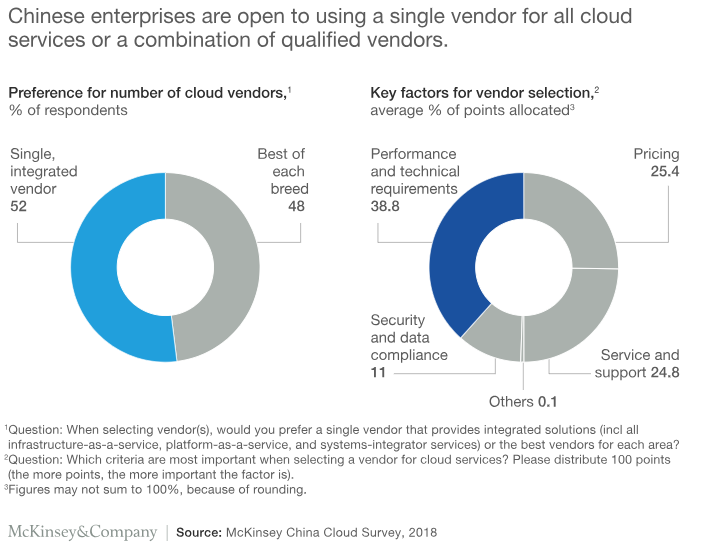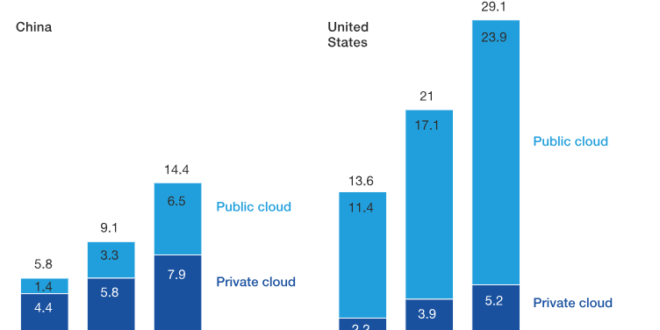Red Hat sounds like a small, theatrical wardrobe agency near the heart of London’s theaterland in Soho. But in reality, it is a software company with its head in the clouds and its feet firmly on the ground.
Earlier this week, the century-old technology giant IBM splashed out US$34 billion to buy Red Hat as it moved into the cybersphere of Amazon, Google and Microsoft.
Known as the ‘cloud’, it rains code, which will provide the “digital infrastructure of tomorrow’s cities,” as well as today’s streaming and data storage demands.
In practice, this tech-speak definition simply refers to having servers in remote data centers, which handle programs and information that can easily be accessed by businesses and consumers for a fee.
“You name it, it’s happening in the cloud,” Rob Enderle, the president and principal analyst at Enderle Group, a technology research company, said. “It’s really where everything is being done now.”
But not in China. A survey released by McKinsey & Company showed that the delay to embrace cloud culture by the world’s second-largest economy was a “major factor” behind low “digitization rates.”
At first glance, growth in the sector appears to be impressive. Up to 14% of the country’s IT budget was pumped into “cloud services” last year.
Indeed, that was more than “double the amount spent in 2013.”
“But even with this growth, China still lags behind its global peers in cloud expenditures,” McKinsey stated. “In the United States, for instance, cloud spending accounted for around 29% of the total IT budget in 2017, up from around 14% in 2013.
“For Chinese business leaders, the hesitation to adopt cloud technologies isn’t just an IT issue – it’s at the root of a much larger problem. Although [it is] technologically advanced with the world’s largest e-commerce market and a thriving mobile-payments landscape, businesses have been slow to invest in IT initiatives that improve operational efficiencies [such as the cloud],” the global research and consultancy added.
Slowly, this is changing. Part of the high-tech “Made in China 2025” program involves high-speed, 5G connectivity with Beijing increasing investment in its ‘smart infrastructure for smart cities’ approach.
Technological innovation is a phrase constantly being uttered in government circles, despite rising trade tensions with the United States.
“Within the technology sector, Chinese business leaders now acknowledge that their low cloud-usage rates are an increasing liability,” the McKinsey survey highlighted. “They’re demonstrating their concern by increasing investment in both the public and private cloud [to] leapfrog their global peers.
“Even the Chinese government has taken note of the cloud’s importance and has stated its commitment to growth. According to an action plan issued by the Chinese Ministry of Industry and Information Technology, officials want to increase the scale of the cloud-computing industry more than 2.5 times by 2019,” the study reported.

The IBM deal has illustrated just how vital the cloud has become with its gigantic warehouse of big data for the corporate world and its expansive social media and entertainment applications, driving portals such as Nextfix, Facebook and Instagram.
With its headquarters in North Carolina, Red Hat specializes in Linux operating systems based on leading open-source software. This is considered a useful and a cheaper counterpoint to the proprietary Microsoft model.
Still, Red Hat’s business strategy of charging fees to corporate customers for purpose-built services, maintenance, and technical support will give IBM a lucrative new stream of subscription revenue. It will also guarantee the company a place alongside the top cloud chasers, Amazon Web Services, Microsoft’s Azure and the Google Cloud Platform.
“Cloud will provide the digital infrastructure of tomorrow’s cities, where an estimated six billion of the world’s population will live by 2045,” Joy Tan, who leads the communications and branding team at Huawei, the Chinese telecom group, said. “Smart elevators and parking lots, driverless cars and drone taxis, trains and subways, farms and power plants – all will be safer and better managed, thanks to the cloud’s ability to store and analyze data.”
As for China, Alibaba has started to make significant inroads as the market expands. Gartner, the global research group, has projected that global cloud services will reach $338 billion by 2022 compared to around $187 billion in 2018.
“The cloud will also be transformative for companies, especially small- and mid-sized businesses, as data analytics, artificial intelligence, and other capabilities become available as services,” Tan wrote on Forbes’ website.
Cloud hopping, it seems, is not just for the theatrical angels.
continue reading
 Unmanned Aerial Vehicle The latest drone news
Unmanned Aerial Vehicle The latest drone news





